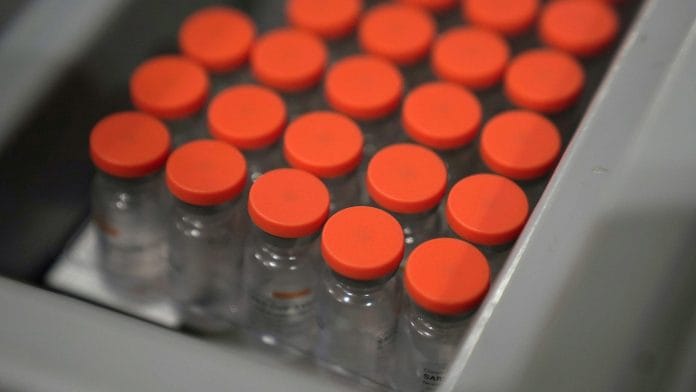New Delhi: CoronaVac, the Covid-19 vaccine developed by Chinese biopharmaceutical company Sinovac, has been found to be safe in children and adolescents, and generating a strong antibody response, according to results of clinical trials published in The Lancet Infectious Diseases journal.
The phase 1/2 clinical trial of CoronaVac — recently approved for emergency use in China among children over 3 years old — was conducted in 550 children and adolescents aged 3-17 years in China.
More than 96 per cent of children and adolescents who received two doses of the vaccine developed antibodies against SARS-CoV-2, according to the study.
Most adverse reactions were mild or moderate, with pain at the injection site the most commonly reported symptom.
“Children and adolescents with COVID-19 usually have mild or asymptomatic infections compared with adults; however, a small number may still be at risk of severe illness. They can also transmit the virus to others, making it vital to test the safety and effectiveness of COVID-19 vaccines in younger age groups,” Qiang Gao of Sinovac Life Sciences Co. Ltd said in a statement.
“Our finding that CoronaVac was well tolerated and induced strong immune responses is very encouraging, and suggests that further studies in other regions, involving larger, multi-ethnic populations, could provide valuable data to inform immunisation strategies involving children and adolescents,” Gao added.
Also read: A coronavirus epidemic broke out 20,000 yrs ago too & this is the impact it had on the world
Trial details
The trial was conducted in Zanhuang County between 31 October and 2 December 2020. As many as 72 participants were enrolled in phase 1, with 480 participants enrolled in phase 2 between 12 December and 30 December 2020.
Either 1.5 micrograms (µg) or 3µg per dose of the vaccine or a placebo was given by intramuscular injection in two doses, at an interval of 28 days.
Among the 550 participants who received at least one dose of vaccine or the control, adverse reactions within 28 days occurred in 56 (26 per cent) of 219 participants in the 1.5µg group, 63 (29 per cent) of 217 in the 3µg group, and 27 (24 per cent) of 114 in the control group.
Most adverse reactions were mild or moderate, with pain at the injection site the most commonly reported symptom. Only one serious adverse reaction — a case of pneumonia — was reported in the control group; however, this was unrelated to the Covid vaccination, according to the researchers.
In phase 1, 100 per cent of participants in both the 1.5µg and 3µg groups generated antibodies against SARS-CoV-2. The group that received the 3µg doses had higher levels of antibodies that could neutralise the virus.
In phase 2, 97 per cent of participants in the 1.5µg group produced antibodies against SARS-CoV-2, compared with 100 in the 3µg group.
Immune responses among children and adolescents were higher than those in adults aged 18-59 years and elderly aged 60 years and older, the researchers noted. This is consistent with the findings from other vaccine trials which show that immune response is decreased with increasing age.
Based on their results, the researchers recommend two 3µg doses of the vaccine for children and adolescents aged 3-17 years.
Also read: Mysteriously deleted Wuhan Covid gene sequences found, US confirms removal from database






